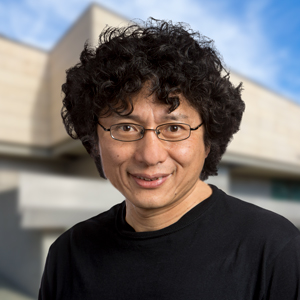Source: Interfolio F180

Jin-Quan Yu, PhD
Research Focus
Rational-design and unexpected discovery of new reactions through C-H activation.
Our program centers around the discovery of catalytic carbon-carbon and carbon-heteroatom bond forming reactions based on C-H activation. Target transformations are selected to enable 1) the use of simple and abundant starting materials such as aliphatic acids, amines and alcohols, and 2) disconnections that drastically shorten the synthesis of drug molecules or a major class of biologically active compounds. Ultimately, we hope to develop catalytic reactions to parallel enzymatic transformations in terms of reactivity and selectivity. To achieve this goal, our research activities are directed towards the following main aspects: C-H activation, sustainable catalysis, asymmetric catalysis and synthetic applications.
Major components of training for students are organometallic chemistry, asymmetric catalysis (synthesis and characterization of organometallic complexes as catalysts or intermediates; ligand design for chiral control or acceleration) and organic synthesis (in the context of drug discovery and natural product synthesis). We collaborate extensively with computational groups via NSF center (Professor Jamal Musaev, Emory University, Professor Ken Houk, UCLA), as well as pharmaceutical and agrochemical industry (BMS and Syngenta) and Aldrich. We have research projects on the following topics: C-H activation (how to cleave C-H bonds without using forceful conditions?); Catalysis (how to close catalytic cycles under practical conditions?); and Synthetic applications (how to shorten synthetic routes for natural products and drug molecules?).
Education
Ph.D. (Chemistry), University of Cambridge, 1999B.S. (Chemistry), East China Normal University, 1987
M.S. (Organic Chemistry), Guangzhou Institute, 1990
Professional Experience
2010 Professor of Chemistry, The Scripps Research Institute2007 Associate Professor of Chemistry, The Scripps Research Institute
2004 Assistant Professor of Chemistry, Brandeis University
2003 Royal Society Research Fellow, University of Cambridge, UK
Awards & Professional Activities
1990 President award for outstanding postgraduate students, Chinese Academy of Sciences1994 Sino-British Scholarship, Great Britain-China Educational Trust
1999 St John's College Junior Fellowship
2003 Royal Society Research Fellowship
2004 New Faculty Award, The Camille & Henry Dreyfus Foundation
2006 Journal Award, Synlett & Synthesis
2008 Amgen Young Investigator's Award, Amgen
2009 Eli Lilly Charitable Grant Award, Lilly Foundation
2010 Hirata Memorial Award, Nagoya University
2011 Novartis Early Career Award in Organic Chemistry
2012 BMS Award, Bristol-Myers Squibb
2012 ACS Cope Award for Chemistry, American Chemical Society
2012 Mukaiyama Award for Synthetic Organic Chemistry, The Society of Synthetic Organic Chemistry
2013 Raymond and Beverly Sackler Prize in the Physical Sciences, Tel Aviv University
2015 ACS Elias J. Corey Award for Outstanding Original Contribution in Organic Synthesis by a Young Investigator, American Chemical Society
2016 MacArthur Fellowship Award
2017 Pedler Award, Royal Society of Chemistry
2019 Member of the American Academy of Arts and Sciences
2021 Bristol Myers Squibb Endowed Chair in Chemistry
Selected Publications
Chen, Xiao; Hao, Xue- S.; Goodhue, Charl E.; Yu, Jin- Q. Cu(II)-catalyzed functionalizations of aryl C-H bonds using O2 as an oxidant. 2006, 128, 6790-1.
Wang, Donghui; Yu, Jin-Quan Highly convergent total synthesis of (+)-lithospermic acid via a late-stage intermolecular C-H olefination. Journal of the American Chemical Society 2011, 133, 5767-5769.
[View]
Engle, Keary M.; Mei, Tiansheng; Wasa, Masayuki; Yu, Jin-Quan Weak coordination as a powerful means for developing broadly useful C-H functionalization reactions. Accounts of Chemical Research 2012, 45, 788-802.
[View]
Leow, D.; Li, G.; Mei, Tiansheng; Yu, Jin-Quan Activation of remote meta-C-H bonds assisted by an end-on template. Nature 2012, 486, 518-522.
[View]
Tang, R. Y.; Li, G.; Yu, Jin-Quan Conformation-induced remote meta-C-H activation of amines. Nature 2014, 507, 215-220.
[View]

